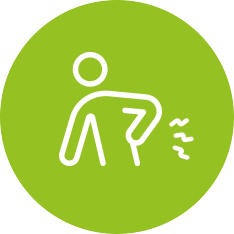New Onset of Low Back Pain
I have new low back pain, what should I do?
Do not panic. There are many reasons as to why your back can become painful and mostly these events are nothing to worry about.
Back pain can vary from mild to very intense, as the back can be a very sensitive area. It is very rare for back pain to be a sign of something serious (even if pain is very bad).
It can be easily managed by following some simple steps. Most new back pain will fade in 2 to 6 weeks and can resolve in 6 to 12 weeks.
What are the symptoms?
- Pain in the back, pelvis, or hips, and sometimes the leg too (see our page on sciatica).
- Pain may limit certain movements at the back (like leaning forwards), or general stiffness to all back movements.
- Some people describe muscle tension or muscle spasms
What if I have other symptoms or if I had a fall?
Please read the "symptoms to check" in the red box on the right of this screen first before using this page.
What are the causes?
Back pain is very common. Most of us will experience some back pain in our lives.
Back pain can appear with no clear trigger, or some people can describe a movement that started the symptoms. This may be sports injury or a fall, but it can also be a simple movement we do a lot, usually with no issues, like picking up a towel.
The back has lots of muscles, joints and discs that might be involved in a pain episode. These structures can heal and repair if they have been injured or inflamed. It is not essential to identify the structures involved, as this will not usually change the advice you are given. The spine is a strong and resilient structure.
You can reduce your risk of back pain by living a healthy lifestyle. Access our "Healthy You" page for information on exercise, mental health, smoking and weight management.
What can I do to help myself?

What else can I do?
Any movement or exercise can help! You may feel more confident starting with gentler exercise types like walking, swimming and stretching. Aim to get confident with using and moving your back again.
There are no movements that will be dangerous or cause damage to your back. It is ok to return to sports or the gym, if you feel up to it. But you may need to modify exercises or do a bit less than usual. (Avoiding all pain isn’t necessary, but you do not need to ‘push through’ pain either, especially if it is spoiling your enjoyment of exercise!)
We have included some exercises for you to try:
Exercises for new onset of back pain - EASY
Exercises for new onset of back pain - MODERATE
Exercises for new onset of back pain - ADVANCED
Is back pain caused by bad posture?

Do I need an x-ray or a scan?
In most cases, no. Scans and x-rays are rarely useful in diagnosing back pain. While a scan or x-ray sometimes provides information, it rarely alters the treatment plan.
Imaging findings are very poorly linked with pain. Often people with no pain have very similar findings on their scans/x-rays to those with pain, and the words used in scan reports can make us worry unnecessarily.
X-rays and scans can help for a small number of people in certain situations and will be recommended by a healthcare professional if required.
Back pain facts

Symptoms to check
Click the plus sign to see a list of problems that could be a sign you may need to be checked urgently
When to get immediate medical advice
You should contact a GP or NHS 111 immediately if you have back pain and:
- numbness or tingling around your genitals or buttocks/inner thighs
- loss of bladder or bowel control or difficulty urinating, leaking of urine or bowel movements.
- Changes in sexual function, including loss of sensation during intercourse, inability to achieve an erection or ejaculate
- sudden, significant weakness in your arms or legs
- lack of coordination or heaviness to your arms and legs that is affecting your walking
- severe arm pain with accompanying tingling or numbness
- chest pain
- a high temperature (fever) of 38C (100.4F) or above
- a swelling or a deformity in your back
- it does not improve with or at rest or is worse at night
- it started after a serious accident, such as after a car accident
These problems could be a sign of something more serious and need to be checked urgently.
Click here to find out more about the warning signs of cauda equina
Immediate medical advice is available by contacting NHS 111


 Back
Back